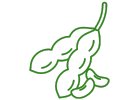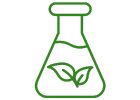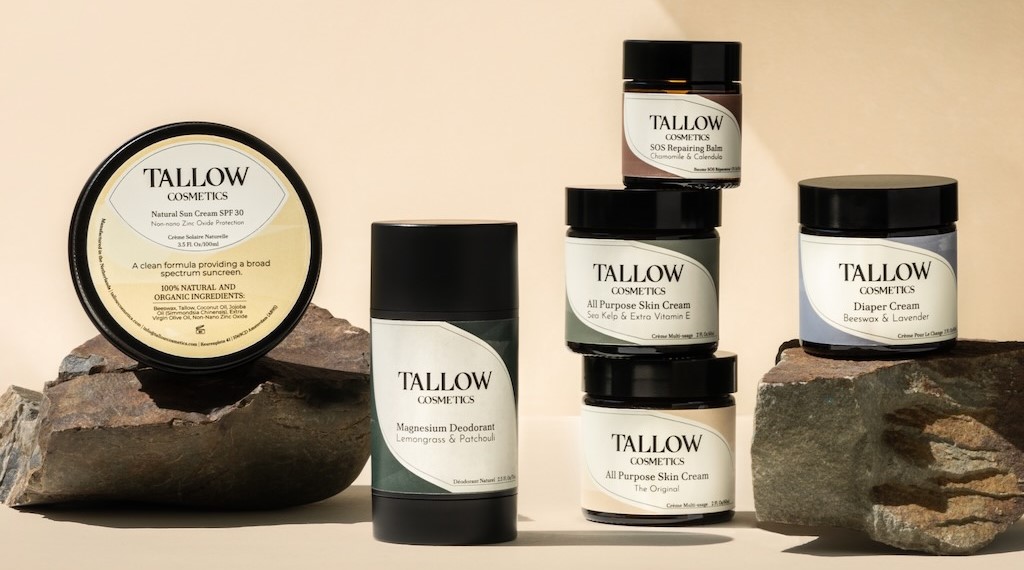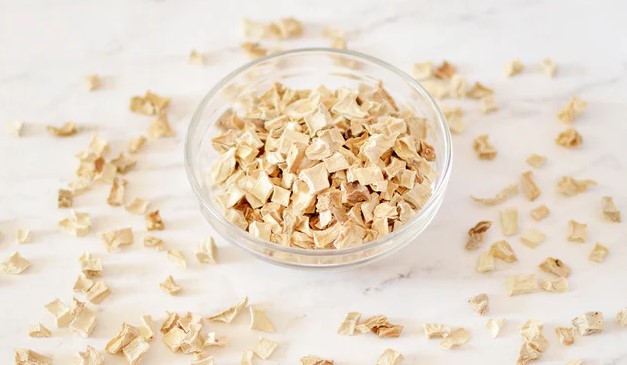Dried graviola leaves for tea - Soursop

For your purchase, we will credit you:
+74.5 Kreditů to Bonus programmeWhy buy
Graviola anona is a plant native to the Amazon rainforest, but it is also grown in other tropical and subtropical regions of the world, including India. It is a versatile herb, its effects on our body are positive in literally every way.
The large, fresh yellow-green fruits are used to make tasty and healthy juices and juices. The substances contained in the plant (leaves, bark, fruits) act primarily on our immune system, which they effectively strengthen and give the body enough energy and vitality.
You can also find sun-dried pieces of this fruit in our offer, while preserving all the nutritional values. The fruit is not sulphured and has no added sugar.
Try on its own as a tasty fruit snack or add pieces to various porridges, granolas, etc. For a softer consistency, just soak in lukewarm water for a while. It'll be easier to chew.
How is graviola used?
- The leaves are used as a tea. In Caribbean countries, tea is served to children and adults before bedtime - locals swear it's great for sleep.
- The fruits (despite the common name 'soursop') are sweet, soft and tender.
- Fruits provide various nutrients including vitamins C and B (including thiamine, riboflavin and niacin) as well as minerals: calcium, phosphorus and iron (Source: González-Stuart, 2014; Small, 2012; Duke, 1986; Morton, 1979).
What are the benefits of graviola?
- In traditional herbal medicine, the fruits and leaves of the tree are used to relieve digestive problems (including diarrhea), pain, hypertension, inflammation, fever, cough and asthma, and many other health problems.
- The leaf tea is said to have calming and soothing effects, especially for insomnia and nervous disorders, but should not be used with young children.
- The leaves and fruits contain natural compounds that could potentially be beneficial in the treatment of prostate and other cancers, although further scientific studies are needed.
- Some studies have shown that the active substances of the plant have antioxidant, anticancer, anticonvulsant, antiarthritic, antiparasitic, antimalarial, liver protective and antidiabetic effects.
- Extracts of graviola/soursop have promising potential for the treatment of gastric ulcers.
- A study has shown that the alcohol extract of graviola has antiviral activity.
- Extracts from the fruit peel showed antimicrobial activity.
Source : https://www.utep.edu/herbal-safety/herbal-facts/herbal%20facts%20sheet/soursop.html
Read on the topic of healthy lifestyle
Ingredients
100% organic dried leaves of Graviola fruit tree (Soursop)
Storage
The strength and flavour of graviola leaves remains strong when the leaves are stored airtight and away from sunlight and moisture. Shelf life is two years from packaging. After opening the bag, transfer the leaves to a sealed container to keep them potent for as long as possible.
Side effects
Graviola leaf tea should not be taken especially during pregnancy and breastfeeding. Also because it lowers blood pressure, dampens the heart rhythm and dilates blood vessels. This means that it should not be taken by patients who are taking blood pressure lowering drugs and heart medications. Graviola should also not be taken by people with low blood pressure.
Prepare tea from graviola leaves
- 1 tablespoon of loose, coarsely chopped dry soursop leaves.
- 2 cups of water
- Optional: sweetener of your choice (e.g. honey, sugar or stevia) to taste.
Preparation instructions:
- Boil water: bring 2 cups of water to a boil in a pot or kettle.
- Add soursop leaves: Once the water reaches boiling point, add one tablespoon of loose, coarsely chopped dry soursop leaves to the boiling water.
- Boil the leaves: Reduce the heat to low and let the soursop leaves simmer in the water for 10 to 15 minutes. This brewing will allow the beneficial substances from the leaves to leach out into the water and form a tea.
- Strain the tea: After boiling, remove the pot and strain the tea to remove the soursop leaves. You can use a fine sieve or a tea funnel. Alternatively, pour the tea through a coffee filter to get a purer tea.
- Sweeten to taste (optional): if desired, add sweetener to the strained soursop leaf tea. Honey, sugar or stevia are commonly used, but you can adjust the amount of sweetener to suit your taste preferences.
- Serve and enjoy: pour the soursop leaf tea into a cup and enjoy it while it is still warm. If you prefer cold tea, you can also chill it in the fridge.
Remember that soursop leaf tea is generally considered safe when consumed in moderation. However, if you have any underlying health problems or are taking medication, you should consult a health professional before including soursop leaf tea in your diet. Pregnant or breastfeeding women should exercise caution and seek medical advice before consuming herbal teas.

Ceylon Kokonati uses only single origin, ethically harvested non GMO ingredients for their products. Their products are vegan, gluten-free, suitable for keto, paleo and raw diets. They do not contain any refined white sugar.
By buying them, you support traditional livelihoods and reduce your carbon footprint - because the products are produced and packaged right at the harvest site. Ceylon Kokonati strives for 100% zero waste production.
This product is internationally accredited by Control Union, certified organic (EU and USDA NOP), ISO and/or HACCP certified.
Ceylon Kokonati manufactures its products in a family-run sweatshop, pays fair prices to its suppliers and manufacturers, and incorporates generations of knowledge into its production processes. It uses only the highest quality ingredients.
So you can be sure that you are getting premium quality at a premium price. By purchasing products, you will be supporting the traditional livelihoods of villagers in the dry areas of Sri Lanka. This allows the villagers to benefit from their years of knowledge and expertise.
The sale of these products plays a vital role in employment and economic support for the village community. Ceylon Kokonati provides the children of its employees with school books and stationery for the entire school year.
What is single origin or "single origin"?
This claim means that the raw material comes from one geographical area(as opposed to raw materials taken from several countries around the world and then mixed together = a common practice for cheap products from so-called private labels).
None of Ceylon Kokonati's products is a so-called blend of several different ingredients from different parts of the world, bought at the cheapest prices. In English it is called'not blended'.
The fact that Ceylon Kokonati's ingredients/products are "single origin" from Sri Lanka only, means that the consumer's taste buds have a more consistent and higher quality experience, from batch to batch.
It is almost impossible to achieve an absolutely consistent taste without losing the natural flavour of the raw material. This is especially the case when the raw material for the production of a product is sourced from different places and of different quality.
In addition, you have no guarantee that it is really a pure and freshly produced product in organic quality.
Additional parameters
| Category: | Teas |
|---|---|
| Certification: | USDA Organic |
| Proč koupit: | Ruční výroba, podpora nejchudších obyvatel planety, vysoká bio kvalita surovin |
| Výrobce: | Ceylon Kokonati |
| Vhodné pro: | Certifikace BIO-Vegan-Raw-GMO Free |
| Země původu: | Srí Lanka |
| The item has been sold out… | |
Clever Coconut Bi Product Uses
Uses for coconut oil
Be the first who will post an article to this item!
The Ceilon Kokonati brand was established in 2013. In its range you can find a variety of high quality and affordable products made from sustainably produced coconuts, spices and tropical fruits.
The brand's name refers to the country that its founders consider home, Ceylon, Sri Lanka, where the coconuts for the coconut line of products are grown and processed. Ceylon, a British Crown Colony from 1815-1948, is now known as Sri Lanka, but the founders of the brand prefer to call it Ceylon because it definitely sounds more exotic and "pure Ceylon" is a brand in itself, reminiscent of the fresh unique essence of pure Ceylon tea. "Kokonati" on the other hand is Maori for coconut, so absolutely the most appropriate brand name for the most coconutty goodness ever.
The Ceilon Kokonati brand is run by a married couple. The female founding half is Mrs. Bûmika, which means Lady of the Earth in Sanskrit. Her great-grandfather was one of the pioneers of coconut oil pressing in Ceylon, making her the fourth generation of coconut oil presser. The male founding half, Mr. Mosqi, in turn, is originally a pure Ceylon tea grower.
Ceylon Kokonati is wholly owned and operated in New Zealand. Loose products from Kokonati uses several ethical brands that produce clean, organic food and beauty products. By selling Kokonati products, rural communities and traditional livelihoods are supported. All their products are ethically harvested and there is almost no waste in their production. Each part of the coconut is used in the production of a different product. Kokonati products are single-ingredient, packaged directly at the source, never mixed, single-species, non-GMO and vegan.
With a passion for organic, regenerative farming, sustainability and collective partnerships, Kokonati products come only from small farms and mills in rural villages in Sri Lanka. Each Kokonati product is produced in a specialized mill that produces only that type of product. Quality is therefore the best it can be, and every step of production is backed by the experience and knowledge of many generations. Ceylon is blessed with an abundance of healthy, exotic fruits, nuts, herbs and spices.
Ceylon Kokonati follows the principles of balanced living - live and let live.
They're trying to keep everything in even better condition than when they found it..

.jpg)



























































![NORTH AMERICAN HERB & SPICE - Sibiřský Čagový Čaj s MACOU a BŘEZOVOU KŮROU - CHAG-O-CHARGE [90g]](https://cdn.myshoptet.com/usr/www.pravebio.cz/user/shop/detail/1145-3_north-american-herb-spice-sibirsky-cagovy-caj-s-macou-a-brezovou-kurou-chag-o-charge--90g-.jpg?66db503c
)













